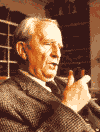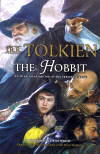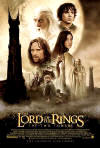|
J. R. R. Tolkien
 A
man who looked more like your paternal grandfather than one of the most
beloved storytellers in history, John Ronald Reuel Tolkien was born in
Bloemfontein, South Africa, on January 3, 1892. Not content with life
as he found it, he created a fantasy world all his own. He named it Middle
Earth and inhabited it with creatures he called hobbits, such as Bilbo and
Frodo Baggins, as well as with dragons, goblins, trolls, orcs, and elves. A
man who looked more like your paternal grandfather than one of the most
beloved storytellers in history, John Ronald Reuel Tolkien was born in
Bloemfontein, South Africa, on January 3, 1892. Not content with life
as he found it, he created a fantasy world all his own. He named it Middle
Earth and inhabited it with creatures he called hobbits, such as Bilbo and
Frodo Baggins, as well as with dragons, goblins, trolls, orcs, and elves.
Educated at Oxford during World War I, Tolkien spent his free
time inventing languages and writing poetry. When he was called for
active duty, he served in the Western Front at the Battle of Somme. He
fought bravely in French warfare until being hospitalized with trench fever,
a typhus-like infection common in the unsanitary conditions of the day, and
in early November he returned to England, where he spent the next month in a
hospital in Birmingham. By Christmas he had recovered sufficiently to
stay with his wife, Edith, at Great Haywood in Staffordshire.
 During his first few months back from the war, Tolkien
learned that all but one member of his unit had been killed in battle.
Out of memory to them, as well as out of his own experiences and his
reaction against war, he began to put the stories that had been rattling
around his head for so long to paper. During his first few months back from the war, Tolkien
learned that all but one member of his unit had been killed in battle.
Out of memory to them, as well as out of his own experiences and his
reaction against war, he began to put the stories that had been rattling
around his head for so long to paper. He visited his characters
"... in huts full of blasphemy and smut, or by candle light in bell-tents,
even some down in dugouts under shell fire [ Letters 66]."
One afternoon, while he and Edith were walking in the woods
at nearby Roos, Edith began to dance for him in a thick grove of hemlock.
The dance inspired Tolkien to create the tale of Beren and Lúthien, a
recurrent theme in his Legendarium. He came to think of Edith
as Lúthien and himself as Beren.
 The ordering of his imagination eventually developed into
the Book of Lost Tales (not published in his lifetime), in
which most of the major stories of the Silmarillion appear in
their first form: tales of the Elves and the "Gnomes," (i. e. Deep Elves,
the later Noldor), with their languages Qenya and Goldogrin. Here he
recorded the first versions of the wars against Morgoth, the siege and
fall of Gondolin and Nargothrond, and the tales of Túrin and of Beren and
Lúthien. The ordering of his imagination eventually developed into
the Book of Lost Tales (not published in his lifetime), in
which most of the major stories of the Silmarillion appear in
their first form: tales of the Elves and the "Gnomes," (i. e. Deep Elves,
the later Noldor), with their languages Qenya and Goldogrin. Here he
recorded the first versions of the wars against Morgoth, the siege and
fall of Gondolin and Nargothrond, and the tales of Túrin and of Beren and
Lúthien.
In 1925, when a position for
a professor at Oxford opened, Tolkien applied for and received it.
Already an acknowledge master of Middle and Old English, he found that he
fit well into the mostly male world of teaching, researching, and the
exchange of philosophical ideas. He found, too, that teaching allowed
him more free time to continue tinkering in his mind with the formulations
of his fantasy
Middle World.
 At
home, life couldn't have been better. Edith bore the last of their children, their only
daughter, Priscilla, in 1929, and Tolkien soon grew into the habit of
writing them annual illustrated letters as if from Santa Claus. A
number of these letters were published in 1976 as The Father Christmas
Letters. At
home, life couldn't have been better. Edith bore the last of their children, their only
daughter, Priscilla, in 1929, and Tolkien soon grew into the habit of
writing them annual illustrated letters as if from Santa Claus. A
number of these letters were published in 1976 as The Father Christmas
Letters.
Socially, the Tolkiens were well regarded. Tolkien soon became one of the founder members of a loosely organized group
of Oxford friends who shared similar interests. They called themselves
"The Inklings." The origin of the name was purely whimsical. It
had to do with writing and sounded somewhat Anglo-Saxon. It had
nothing to do with the claim that members of the group had an "inkling" into
Divine Nature, as some suggest.
Prominent members of the group
included Coghill and Dyson, as well as Owen Barfield, Charles Williams, and
C. S. Lewis, who became one of Tolkien's closest friends and for whose
return to Christianity Tolkien was at least partly responsible. The
Inklings met regularly for conversation, drink, and frequent readings from
their works-in-progress.
 All the while, Tolkien continued developing his mythology
and languages until one day in 1930, according to the author, himself, he
was marking exam papers when he discovered that one of his students had left
a page blank. On this page, moved no doubt by anachronic demons and
goblins, Tolkien wrote, "In a hole in a ground there lived a hobbit...."
The novel, The Hobbit, followed in 1937. After that, the
sequel trilogy, The Lord of the Rings, was born. All the while, Tolkien continued developing his mythology
and languages until one day in 1930, according to the author, himself, he
was marking exam papers when he discovered that one of his students had left
a page blank. On this page, moved no doubt by anachronic demons and
goblins, Tolkien wrote, "In a hole in a ground there lived a hobbit...."
The novel, The Hobbit, followed in 1937. After that, the
sequel trilogy, The Lord of the Rings, was born.
"If you care for journeys there and back, out of the comfortable
Western world, over the edge of the Wild, and home again, and can take an
interest in a humble hero (blessed with a little wisdom and a little
courage and considerable good luck), here is a record of such a journey
and such a traveler." - introduction from The Hobbit
The Lord of the Rings was widely accepted by the public,
although reviews, not unexpectedly, were mixed. They ranged from laudatory (W.
H. Auden, C. S. Lewis) to damning (E. Wilson, E. Muir, P. Toynbee).
The BBC put on a
drastically condensed radio adaptation in 12 episodes on the Third Programme,
the network's "intellectual" channel, in 1956. Hardback sales were so
strong that Tolkien actually toyed with the idea of retiring from academia
to write full time.
 But the book received its greatest push for two reasons when The
Lord of the Rings went into a pirated paperback version in 1965.
First, the paperback version propelled the book out of libraries and schools
and put it into the back pockets of impulse-buying readers. Second,
the publicity generated by the copyright dispute alerted millions of
American readers to the existence of something outside their previous realm
of experience. By 1968, The Lord of the Rings had become
the Bible of the an Alternative Society. But the book received its greatest push for two reasons when The
Lord of the Rings went into a pirated paperback version in 1965.
First, the paperback version propelled the book out of libraries and schools
and put it into the back pockets of impulse-buying readers. Second,
the publicity generated by the copyright dispute alerted millions of
American readers to the existence of something outside their previous realm
of experience. By 1968, The Lord of the Rings had become
the Bible of the an Alternative Society.
Tolkien went on to write other things--from articles and short stories to
essays, much of them published posthumously, although none matched the
notoriety of his major works.
 After his retirement in 1969, Tolkien and his wife moved to
Bournemouth where, on November 22, 1971, she died. Tolkien returned to
Oxford to rooms provided by Merton College. He died there on September 2,
1973. Some say it was from a broken heart. J. R. R. Tolkien and
his wife, Edith, share a
single grave in the Catholic section of Wolvercote cemetery in the northern
suburbs of Oxford. After his retirement in 1969, Tolkien and his wife moved to
Bournemouth where, on November 22, 1971, she died. Tolkien returned to
Oxford to rooms provided by Merton College. He died there on September 2,
1973. Some say it was from a broken heart. J. R. R. Tolkien and
his wife, Edith, share a
single grave in the Catholic section of Wolvercote cemetery in the northern
suburbs of Oxford.
The Hobbit lives on.

Discover J. R. R. Tolkien
at Amazon.com
Indulge
Yourself - Check Out Today's Best-Selling
Fiction -
Nonfiction -
DVDs |









